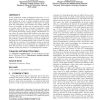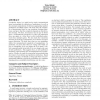160 search results - page 5 / 32 » Approximability of Manipulating Elections |
SIGECOM
2010
ACM
13 years 9 months ago
2010
ACM
In the traditional voting manipulation literature, it is assumed that a group of manipulators jointly misrepresent their preferences to get a certain candidate elected, while the ...
CORR
2012
Springer
12 years 5 months ago
2012
Springer
All previous work on “candidate-control” manipulation of elections has been in the model of full-information, simultaneous voting. This is a problem, since in quite a few real...
CORR
2010
Springer
13 years 9 months ago
2010
Springer
One possible escape from the Gibbard-Satterthwaite theorem is computational complexity. For example, it is NP-hard to compute if the STV rule can be manipulated. However, there is...
SIGECOM
2008
ACM
13 years 9 months ago
2008
ACM
We introduce a class of voting rules called generalized scoring rules. Under such a rule, each vote generates a vector of k scores, and the outcome of the voting rule is based onl...
ATAL
2008
Springer
13 years 11 months ago
2008
Springer
Complexity theory is a useful tool to study computational issues surrounding the elicitation of preferences, as well as the strategic manipulation of elections aggregating togethe...


